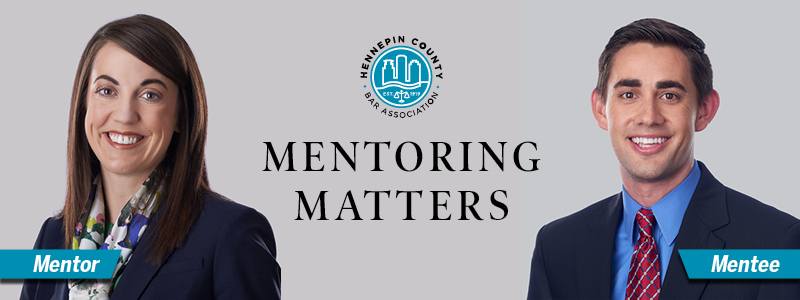
In this new feature, we’ll spotlight two attorneys who are in a mentor/mentee relationship. Our goal is to show how to make the most out of these connections, answer questions you have about mentorship, and inspire you to connect with other attorneys.
Mentee
Neal K. Rasmussen is a transactional attorney at Ballard Spahr with a diverse corporate practice. Neal advises private and public companies and private equity funds on mergers and acquisitions, entity formation, corporate governance, divestitures, and general contract matters. He assists clients across a broad spectrum of industries, including manufacturing, food and beverage, health care, and technology.
Mentor
Maggie Tatton is a Practice Co-Leader of Ballard Spahr’s Mergers and Acquisitions Group. She focuses her practice on representing private and public companies and private equity funds in mergers, acquisitions, sales and other strategic business transactions, including joint ventures, minority investments, roll-ups and carve-out transactions.
Mentee Questions with Neal Rasmussen
What sparked a connection with your mentor?
Maggie has a well-established mergers and acquisitions practice. Shortly after I joined the firm, I knew that Maggie was someone I wanted to learn from, and our mentorship relationship developed organically from there. From day one, she has been invested in my career development, which isn’t something newer attorneys get at every firm.
What’s one thing you learned from your mentor?
Not to lose sight of the end goal. Maggie is very practical and solutions-oriented. She’s able to work through issues in practical ways that not only achieve great results for her clients but also drive matters towards the ultimate goal. I know her clients and colleagues appreciate that about her, and it’s something I’ve emulated in my practice.
What’s one word you would use to describe your mentor?
Driven. Maggie’s commitment and dedication never waver, and that often serves as a morale boost for me. It really helps to have a role model of professionalism and dedication.
How has having a mentoring relationship helped you during the COVID pandemic?
I’ve found it to be a good reminder that while we’re each good on our own, we’re all better when working together. There are many times working with Maggie has enhanced what I’ve been able to do on my own. That helps me see the benefit of professional working relationships, and the value of a department where people lend a hand and help one another out.
What’s one piece of advice you have to create a strong mentorship connection?
For mentees, I would advise thinking carefully about whom you’d like to ask to mentor you, and why. It helps if you can have some loose goals for the relationship. You don’t need a checklist or a formal agenda, but it’s good to have a sense of why you’re seeking out this mentor relationship and what you see as the benefit.
Mentor Questions with Maggie Tatton
What sparked a connection with your mentee?
Neal is a very talented M&A attorney, but I have learned that talent on its own only gets you so far. It has to be paired with an enthusiasm for the subject matter, a genuine appreciation for what you’re doing, and a drive to work very hard. Very early on, I saw those in Neal, and it makes working with him very rewarding.
What’s one thing you learned from your mentee?
That there’s more than one way to approach an issue. It’s really easy to fall into an established pattern. I know I do it myself sometimes. When something works once, it tends to be the way you approach things going forward. Working with Neal is a consistent reminder to take a step back and see if a fresh perspective brings anything to light. He’s naturally very good at that.
What’s one word you would use to describe your mentee?
Sharp. Neal’s insight and ability to apply his thinking to the situation at hand are remarkable.
How has having a mentoring relationship helped you during the COVID pandemic?
During the pandemic, especially in a work from home environment, I quickly realized it would be very easy to lose or weaken the professional relationships I have spent so many years developing. I had to take affirmative steps to make sure that did not happen to our mentoring relationship, which was a helpful reminder to do the same for my other relationships.
What’s one piece of advice you have to create a strong mentorship connection?
Don’t force it. If a connection isn’t there, you can go through all the motions, but neither person will get much out of it. I don’t think that’s a bad thing. Mentor relationships have to be a good fit, and that good fit is worth prioritizing.
A special thanks to Will Ashenmacher for his help putting together this article.